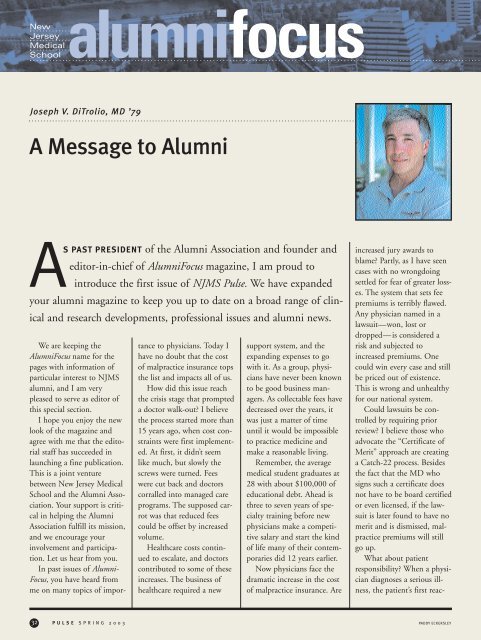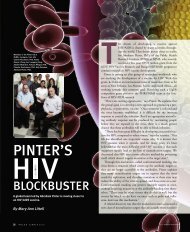changing the course of stroke - New Jersey Medical School ...
changing the course of stroke - New Jersey Medical School ...
changing the course of stroke - New Jersey Medical School ...
You also want an ePaper? Increase the reach of your titles
YUMPU automatically turns print PDFs into web optimized ePapers that Google loves.
<strong>School</strong>alumnifocus<br />
<strong>New</strong><br />
<strong>Jersey</strong><br />
<strong>Medical</strong><br />
Joseph V. DiTrolio, MD ’79<br />
A Message to Alumni<br />
AS PAST PRESIDENT <strong>of</strong> <strong>the</strong> Alumni Association and founder and<br />
editor-in-chief <strong>of</strong> AlumniFocus magazine, I am proud to<br />
introduce <strong>the</strong> first issue <strong>of</strong> NJMS Pulse. We have expanded<br />
your alumni magazine to keep you up to date on a broad range <strong>of</strong> clinical<br />
and research developments, pr<strong>of</strong>essional issues and alumni news.<br />
We are keeping <strong>the</strong><br />
AlumniFocus name for <strong>the</strong><br />
pages with information <strong>of</strong><br />
particular interest to NJMS<br />
alumni, and I am very<br />
pleased to serve as editor <strong>of</strong><br />
this special section.<br />
I hope you enjoy <strong>the</strong> new<br />
look <strong>of</strong> <strong>the</strong> magazine and<br />
agree with me that <strong>the</strong> editorial<br />
staff has succeeded in<br />
launching a fine publication.<br />
This is a joint venture<br />
between <strong>New</strong> <strong>Jersey</strong> <strong>Medical</strong><br />
<strong>School</strong> and <strong>the</strong> Alumni Association.<br />
Your support is critical<br />
in helping <strong>the</strong> Alumni<br />
Association fulfill its mission,<br />
and we encourage your<br />
involvement and participation.<br />
Let us hear from you.<br />
In past issues <strong>of</strong> Alumni-<br />
Focus, you have heard from<br />
me on many topics <strong>of</strong> impor-<br />
32<br />
PULSE SPRING 2003<br />
tance to physicians. Today I<br />
have no doubt that <strong>the</strong> cost<br />
<strong>of</strong> malpractice insurance tops<br />
<strong>the</strong> list and impacts all <strong>of</strong> us.<br />
How did this issue reach<br />
<strong>the</strong> crisis stage that prompted<br />
a doctor walk-out? I believe<br />
<strong>the</strong> process started more than<br />
15 years ago, when cost constraints<br />
were first implemented.<br />
At first, it didn’t seem<br />
like much, but slowly <strong>the</strong><br />
screws were turned. Fees<br />
were cut back and doctors<br />
corralled into managed care<br />
programs. The supposed carrot<br />
was that reduced fees<br />
could be <strong>of</strong>fset by increased<br />
volume.<br />
Healthcare costs continued<br />
to escalate, and doctors<br />
contributed to some <strong>of</strong> <strong>the</strong>se<br />
increases. The business <strong>of</strong><br />
healthcare required a new<br />
support system, and <strong>the</strong><br />
expanding expenses to go<br />
with it. As a group, physicians<br />
have never been known<br />
to be good business managers.<br />
As collectable fees have<br />
decreased over <strong>the</strong> years, it<br />
was just a matter <strong>of</strong> time<br />
until it would be impossible<br />
to practice medicine and<br />
make a reasonable living.<br />
Remember, <strong>the</strong> average<br />
medical student graduates at<br />
28 with about $100,000 <strong>of</strong><br />
educational debt. Ahead is<br />
three to seven years <strong>of</strong> specialty<br />
training before new<br />
physicians make a competitive<br />
salary and start <strong>the</strong> kind<br />
<strong>of</strong> life many <strong>of</strong> <strong>the</strong>ir contemporaries<br />
did 12 years earlier.<br />
Now physicians face <strong>the</strong><br />
dramatic increase in <strong>the</strong> cost<br />
<strong>of</strong> malpractice insurance. Are<br />
increased jury awards to<br />
blame? Partly, as I have seen<br />
cases with no wrongdoing<br />
settled for fear <strong>of</strong> greater losses.<br />
The system that sets fee<br />
premiums is terribly flawed.<br />
Any physician named in a<br />
lawsuit—won, lost or<br />
dropped—is considered a<br />
risk and subjected to<br />
increased premiums. One<br />
could win every case and still<br />
be priced out <strong>of</strong> existence.<br />
This is wrong and unhealthy<br />
for our national system.<br />
Could lawsuits be controlled<br />
by requiring prior<br />
review? I believe those who<br />
advocate <strong>the</strong> “Certificate <strong>of</strong><br />
Merit” approach are creating<br />
a Catch-22 process. Besides<br />
<strong>the</strong> fact that <strong>the</strong> MD who<br />
signs such a certificate does<br />
not have to be board certified<br />
or even licensed, if <strong>the</strong> lawsuit<br />
is later found to have no<br />
merit and is dismissed, malpractice<br />
premiums will still<br />
go up.<br />
What about patient<br />
responsibility? When a physician<br />
diagnoses a serious illness,<br />
<strong>the</strong> patient’s first reac-<br />
PADDY ECKERSLEY






